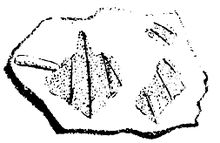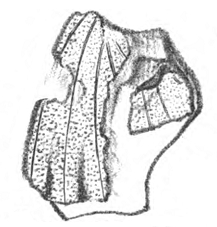Cyllonium
| Cyllonium Temporal range: | |
|---|---|

| |
| Cyllonium boidusvalianum | |

| |
| Cyllonium hewitsonianum | |
| Scientific classification | |
| Kingdom: | |
| Phylum: | |
| Class: | |
| Genus: | †Cyllonium Westwood, 1854 |
| Species | |
|
See text. | |
Cyllonium is a genus of extinct insects. It contains two species.[1]
Discovery
Both species of Cyllonium were first described by the English entomologist John Obadiah Westwood. The fossils were recovered from the Early Cretaceous (Berriasian age) of the Lower Purbeck formation, Durdlestone Bay, England.[2]
Taxonomy
Very little is known of the two fossils as they were published without description. Illustrations, however, were provided, but even these show that the fossils were fragmentary. They were originally identified to be butterflies, but this is now generally not accepted.[3]
They have been tentatively identified as possible palaeontinids (extinct giant cicadas) in 1961.[4]
Species
The two species assigned to the genus are the following:[2]
- †Cyllonium boidusvalianum Westwood, 1854
- †Cyllonium hewitsonianum Westwood, 1854
See also
References
- ^ John Phillips (1855). Manual of geology: practical and theoretical. R. Griffin and company. p. 329.
Cyllonium.
- ^ a b J. O. Westwood (1854). "Contributions to Fossil Entomology". The Quarterly Journal of the Geological Society of London. 10 (1–2). Geological Society of London. Fossil Insects from the Lower Purbecks, Durdlestone Bay, Dorset, pp. 395–396. doi:10.1144/gsl.jgs.1854.010.01-02.43. S2CID 129712238. Retrieved July 13, 2011.
- ^ "Cyllonium Westwood, 1854". Natural History Museum. Retrieved July 13, 2011.
- ^ Bo Wang; Haichun Zhang; Edmund A. Jarzembowski (2008). "A new genus and species of Palaeontinidae (Insecta: Hemiptera: Cicadomorpha) from the Lower Cretaceous of southern England" (PDF). Zootaxa (1751). Magnolia Press: 65–68. ISSN 1175-5326. Retrieved July 13, 2011.
